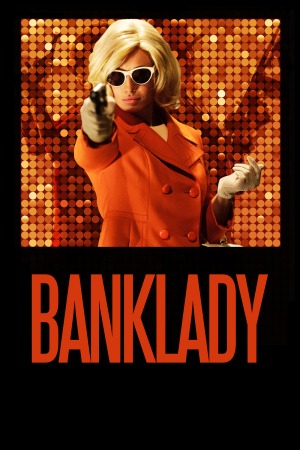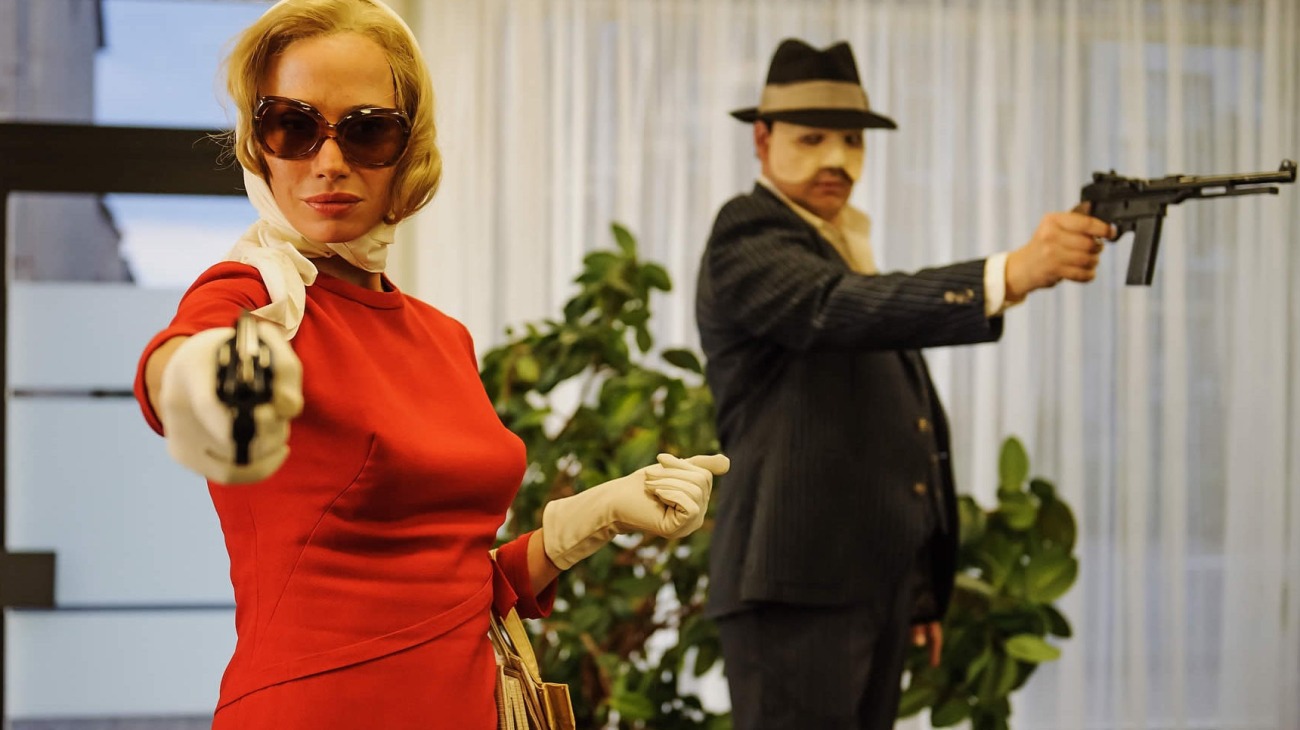
The 49th Chicago International Film Festival
Screens at CIFF: 10/17 & 10/20 & 10/22
World premiere: 29 September, 2013, Hamburg Film Festival
Winner of the Silver Hugo for Best Actress (Nadeshda Brennicke)
The temptation to make all true-life stories about criminals valorised in the media the full-on Bonnie and Clyde treatment is as alive and well in Europe as in the United States, if we're to judge from the evidence of Banklady, a biopic of Gisela Werler (Nadeshda Brennicke), Germany's first female bank robber. For style is something the film has in great abundance; style is perhaps the only thing it has in great abundance, for as much as it tries to make interesting social statements through the vessel of it leading lady, nothing it says quite "takes". I suspect we have here a problem of a film trying to do everything all at once instead of winnowing down its interests to something that could be effectively explored in just two hours - and to be entirely fair to director Christian Alvart (best known in America for the kind of cruddy Renée Zellweger thriller Case 39), he makes those two hours skim by like nothing at all, for even if this is primarily a stylish film, the style pops gorgeously, exactly capturing the essence of the late-'60s era in which the movie takes place. Especially in a giddy pop-colored montage using split-screen frames and collage in one of the legitimately best-edited passages in any film with a 2013 production date (Alvart edited himself, with Sebastian Bonde), brilliantly energetic and the best evocation of the spirit of cinematic New Waves that I've seen in any movie from any country in ages.
In its opening moments, at least, Banklady does seem like it's going to have something big and challenging to say, and even that it might say it pretty damn well.Virtually the first thing that happens in the film is that Gisela, on her way to the ghastly job she has feeding dye into rollers at a wallpaper factory, stops for a long moment to gaze at the depictions of models and celebrities in the bright, gaudy advertisements staring out from every surface along her commute. The implication is made swiftly though juxtaposition of the images with Gisela's own dumpy, mousy face (and Brennicke's exquisite look of pained longing - she gives an absolutely tremendous performance throughout the whole thing, really), that this woman hates the total lack of media-approved beauty in herself, and her own bland little slip of a life, which includes a vanilla schmuck of a kind-of boyfriend, Uwe (Andreas Schmidt), and a joyless life living with, and catering to, her unpleasant, aging parents.
This all shifts in an instant when she spontaneously grabs an attache case Uwe is toting around, and when he comes to retrieve it that night, he has with him Peter (Charly Hübner), who isn't exactly gorgeous, but is the closest this movie comes to it, and as fascination leads to stalking leads to a confrontation on the street, Gisela ends up partnering with Peter to rob banks, she wearing a sexy blonde wig and sophisticated clothes that make her look every inch the jet-setter, and give the Hamburg papers quite a giddy time finding new ways to phrase the idea "bank robber that you would enthusiastically have hot sex with".
In a really reduced form, this could be a terrific takedown of media representations of female beauty, and the way that Gisela only feels sexy and of worth because she has been drawn in various news articles as a dangerous sexpot. And that's not absent from the film, though it's hardly any time at all before that ceases to be a primary focus. Finding and maintaining a focal point is, in fact, the film's biggest stumbling block, not just thematically (media satire, love story, slightly mocking indictment of get-rich-quick schemes, good old-fashioned "root for the criminals" thriller), but even narratively for once Gisela, deemed "Banklady" in the papers, becomes not a serial thief, the newly promoted police Kommissar Fischer (Ken Duken) makes it his Ahab-like quest to find her and stop her using all the newest crimefighting techniques of the '60s. Which is fine, and all - movies need antagonists, anti-heroes need square establishment types - but Banklady very quickly becomes tripped up over how much it wants to be about its criminal lovers, and how much it wants to be a procedural, and there's certainly some shaving that needed to be done to keep the balance more securely in place.
This is, to a certain degree, nitpicking: Banklady tells a ripping good tale, Alvart keeps it fast-paced and exciting, and Brennicke is absolutely incredible, navigating the shift from Gisela the meek little doormat to the danger-junkie Banklady in such a way that you can see the seeds of the latter in the former, and the echoes of the former in the latter; and throughout the movie, the furtive glances and unsaid thoughts that form with a tiny bit too much effort Gisela's face are all flawlessly played. It's a great piece of character creation, full stop. But all of this doesn't do much to offset the significant feeling of sameness to the whole thing; the fact is, we've definitely seen this movie in the broad strokes and even some of the details before, and all the pop-art style and great acting in the world can't keep it from feeling somewhat stale.
7/10
World premiere: 29 September, 2013, Hamburg Film Festival
Winner of the Silver Hugo for Best Actress (Nadeshda Brennicke)
The temptation to make all true-life stories about criminals valorised in the media the full-on Bonnie and Clyde treatment is as alive and well in Europe as in the United States, if we're to judge from the evidence of Banklady, a biopic of Gisela Werler (Nadeshda Brennicke), Germany's first female bank robber. For style is something the film has in great abundance; style is perhaps the only thing it has in great abundance, for as much as it tries to make interesting social statements through the vessel of it leading lady, nothing it says quite "takes". I suspect we have here a problem of a film trying to do everything all at once instead of winnowing down its interests to something that could be effectively explored in just two hours - and to be entirely fair to director Christian Alvart (best known in America for the kind of cruddy Renée Zellweger thriller Case 39), he makes those two hours skim by like nothing at all, for even if this is primarily a stylish film, the style pops gorgeously, exactly capturing the essence of the late-'60s era in which the movie takes place. Especially in a giddy pop-colored montage using split-screen frames and collage in one of the legitimately best-edited passages in any film with a 2013 production date (Alvart edited himself, with Sebastian Bonde), brilliantly energetic and the best evocation of the spirit of cinematic New Waves that I've seen in any movie from any country in ages.
In its opening moments, at least, Banklady does seem like it's going to have something big and challenging to say, and even that it might say it pretty damn well.Virtually the first thing that happens in the film is that Gisela, on her way to the ghastly job she has feeding dye into rollers at a wallpaper factory, stops for a long moment to gaze at the depictions of models and celebrities in the bright, gaudy advertisements staring out from every surface along her commute. The implication is made swiftly though juxtaposition of the images with Gisela's own dumpy, mousy face (and Brennicke's exquisite look of pained longing - she gives an absolutely tremendous performance throughout the whole thing, really), that this woman hates the total lack of media-approved beauty in herself, and her own bland little slip of a life, which includes a vanilla schmuck of a kind-of boyfriend, Uwe (Andreas Schmidt), and a joyless life living with, and catering to, her unpleasant, aging parents.
This all shifts in an instant when she spontaneously grabs an attache case Uwe is toting around, and when he comes to retrieve it that night, he has with him Peter (Charly Hübner), who isn't exactly gorgeous, but is the closest this movie comes to it, and as fascination leads to stalking leads to a confrontation on the street, Gisela ends up partnering with Peter to rob banks, she wearing a sexy blonde wig and sophisticated clothes that make her look every inch the jet-setter, and give the Hamburg papers quite a giddy time finding new ways to phrase the idea "bank robber that you would enthusiastically have hot sex with".
In a really reduced form, this could be a terrific takedown of media representations of female beauty, and the way that Gisela only feels sexy and of worth because she has been drawn in various news articles as a dangerous sexpot. And that's not absent from the film, though it's hardly any time at all before that ceases to be a primary focus. Finding and maintaining a focal point is, in fact, the film's biggest stumbling block, not just thematically (media satire, love story, slightly mocking indictment of get-rich-quick schemes, good old-fashioned "root for the criminals" thriller), but even narratively for once Gisela, deemed "Banklady" in the papers, becomes not a serial thief, the newly promoted police Kommissar Fischer (Ken Duken) makes it his Ahab-like quest to find her and stop her using all the newest crimefighting techniques of the '60s. Which is fine, and all - movies need antagonists, anti-heroes need square establishment types - but Banklady very quickly becomes tripped up over how much it wants to be about its criminal lovers, and how much it wants to be a procedural, and there's certainly some shaving that needed to be done to keep the balance more securely in place.
This is, to a certain degree, nitpicking: Banklady tells a ripping good tale, Alvart keeps it fast-paced and exciting, and Brennicke is absolutely incredible, navigating the shift from Gisela the meek little doormat to the danger-junkie Banklady in such a way that you can see the seeds of the latter in the former, and the echoes of the former in the latter; and throughout the movie, the furtive glances and unsaid thoughts that form with a tiny bit too much effort Gisela's face are all flawlessly played. It's a great piece of character creation, full stop. But all of this doesn't do much to offset the significant feeling of sameness to the whole thing; the fact is, we've definitely seen this movie in the broad strokes and even some of the details before, and all the pop-art style and great acting in the world can't keep it from feeling somewhat stale.
7/10
Categories: ciff, crime pictures, german cinema, the dread biopic, thrillers






